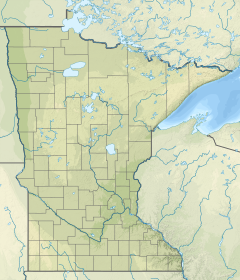The Mustinka River is a tributary of Lake Traverse, 68 mi (109 km) long,[1] in western Minnesota in the United States. Via Lake Traverse, the Bois de Sioux River, the Red River of the North, Lake Winnipeg, and the Nelson River, it is part of the watershed of Hudson Bay. The river drains an area of 909 square miles (2,350 km2).[2][3]
| Mustinka River | |
|---|---|
 A straightened and re-routed section of the Mustinka River in Redpath Township of Traverse County | |
| Location | |
| Country | United States |
| State | Minnesota |
| Counties | Traverse, Grant, and Otter Tail |
| Physical characteristics | |
| Source | |
| • coordinates | 46°12′45″N 96°06′16″W / 46.2124597°N 96.1045034°W |
| Mouth | |
• location | Lake Traverse |
• coordinates | 45°45′54″N 96°37′03″W / 45.7650°N 96.6176°W |
| Length | 68 mi (109 km) |
| Basin size | 909 square miles (2,350 km2) |
| Basin features | |
| River system | Hudson Bay |
Mustinka is a name derived from the Dakota language meaning "rabbit".[4]
Course
editThe Mustinka River rises about 5 miles (8 km) south-southwest of Fergus Falls in southwestern Otter Tail County and initially flows generally southward into Grant County, passing through Stony Brook Lake and Lightning Lake. The river turns westwardly in southern Grant County and flows past Norcross into Traverse County, where it turns southwestward past Wheaton. It flows into the northern end of Lake Traverse from the east, about 7 miles (11 km) southwest of Wheaton.[5] Twelvemile Creek is a tributary of the Mustinka River.[6][7]
Much of the river's lower course has been straightened and channelized.[8]
See also
editReferences
edit- ^ U.S. Geological Survey. National Hydrography Dataset high-resolution flowline data. The National Map, accessed June 8, 2011
- ^ Waters, Thomas F. (1977). The Streams and Rivers of Minnesota. Minneapolis: University of Minnesota Press. ISBN 0-8166-0960-8.
- ^ U.S. Geological Survey Geographic Names Information System: Mustinka River
- ^ Upham, Warren (1920). Minnesota Geographic Names: Their Origin and Historic Significance. Minnesota Historical Society. p. 217.
- ^ DeLorme (1994). Minnesota Atlas & Gazetteer. Yarmouth, Maine: DeLorme. ISBN 0-89933-222-6
- ^ Minnesota. State Drainage Commission, Geological Survey (U.S.) (1912). Report of the water resources investigation of Minnesota, 1911-1912. McGill-Warner. p. 592.
- ^ Waters, Thomas F. (1977). Streams and Rivers of Minnesota. Minneapolis: University Of Minnesota Press. p. 119. ISBN 0816609608.
- ^ Water Resources Development by the U.S. Army Corps of Engineers in Minnesota. Corps of Engineers, North Central Division. 1959.
